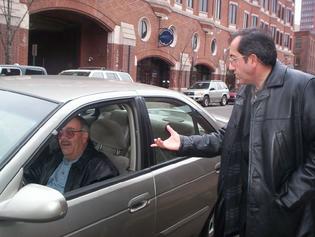Mario Giamio Enters A New Parking World

Mario Giamio thought he was making a routine stop on Whitney Avenue Thursday. Little did he know that an experiment in a whole new way of city parking was beginning -- and he was one of the first subjects. A city traffic official (above) greeted him and walked him through the drill. Read on to learn the drill along with Mario Giaimo.
New Haven has removed the parking meters from Whitney Avenue between Audubon and Trumbull Streets. In its place are kiosks spread out about every 10 spaces. Officials are looking to see how the public reacts to this experiment on Whitney before deciding whether to eliminate conventional meters citywide in favor of the new system.
Giaimo was baffled when he pulled his 2000 Nissan Sentra to a space on Whitney around 11 a.m. to encounter, instead of a parking meter, engineer Bijan Notghi (in above photo with Giamio) of the city traffic department.
Giaimo was baffled when he pulled his 2000 Nissan Sentra to a space on Whitney around 11 a.m. to encounter, instead of a parking meter, engineer Bijan Notghi (in above photo with Giamio) of the city traffic department.
 "See this machine here?" asked Notghi, pointing to one of the kiosks (at left). Giamio got out of the car. Notghi escorted him to the solar-powered kiosk (an "MP104 Compact" model made by a company called Cale Parking Systems). Giaimo needed to pay at the kiosk to park, Notghi explained. After paying, he would receive a slip of paper.
"See this machine here?" asked Notghi, pointing to one of the kiosks (at left). Giamio got out of the car. Notghi escorted him to the solar-powered kiosk (an "MP104 Compact" model made by a company called Cale Parking Systems). Giaimo needed to pay at the kiosk to park, Notghi explained. After paying, he would receive a slip of paper.Asked his initial impression of the new system, Giaimo (who said he's a relative of New Haven's late U.S. Congressman Bob Giaimo) shrugged. "It's not that important to think about," he said. "If that's the law, you've got to obey it."
"Can I buy it for you?" Connolly asked Giaimo.
For the second time in five minutes, Giaimo was startled.
"Can you buy it for me?" he asked.
This new system was starting to look better and better.
Connolly flashed the Parcxmart card. He told Giaimo how it works, how you don't have to bother keeping exact change in your pocket or running to 200 Orange St. or area stores to buy parking vouchers.
"Would you like an hour?" Connolly asked.
Giaimo took a half hour. "I think it's a pretty good idea," he said of the card. "You can save quarters."
Connolly slipped in the card, punched in the time. Out spat a slip of paper. Connolly handed it to Giaimo. He told him to put the top part of the slip in his dashboard window, so meter-readers will know he paid. He told Giaimo to rip off the bottom part -- "as a reminder while you're shopping."
The bottom part also functions as a receipt. So if you get a ticket, you can prove you paid.
Whatever works," Giaimo said, slipping the paper onto his dashboard and setting off across the street. "That's the bottom line."
A Parking Pilot
Notghi and city parking czar Paul Wessel are watching that bottom line to see whether it makes sense to transform the rest of the city along these lines. These newfangled machines ("multi-space meters," in the lingo) are already fixtures throughout Europe. Here in the U.S., New York City and Portland, Oregon, have begun experimenting with them. New Haven's experiment is being paid for by the manufacturer.
"A very competitive industry is trying to sell us and every municipality on this technology. This is a pilot," Wessel said. "We are testing how the technology works and how people like it."
The system will require customers to walk further to deposit money. On the other hand, it gives them those receipts to contest parking tickets, and it can make life simpler once they get used to it.
The system's also easier for officials like Notghi. Each kiosk has a wireless communication system to his office. It lets him know the moment a machine breaks or if a vandal opens it. It also enables Notghi to reprogram meters from his office if, say, it's a parade day and parking is free.
And the system can make a little more parking available on the street. Without meters people need to park exactly by, more drivers will be able to squeeze onto a block.

_thumb.jpg)




Comments
There are no comments yet for this item
Join the discussion